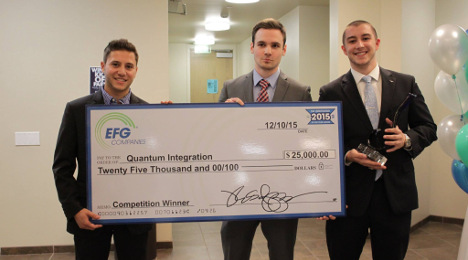Just before 2015 closed, used-vehicle service contract and related finance and insurance product provider GWC Warranty announced the company successfully topped $375 million in claims paid to date.
In reaction to the achievement, GWC Warranty chief executive officer and president Rob Glander said, “Surpassing $375 million in claims is an important milestone for GWC.
“Our slogan is ‘No Worries, Just Drive,’ because when dealers sell a GWC service contract, they can be sure that we’ll stand behind it,” Glander continued. “And their customers can enjoy their vehicle knowing that if a breakdown occurs, GWC will be there to get them back on the road quickly.
“We are thrilled to celebrate the milestone of $375 million in claims paid and we are grateful for the role our dealers have played along the way,” Glander went on to say. “We look forward to continuing our successful partnerships for many more years to come.”
Back in September, GWC Warranty bolstered its offerings by introducing a new 5-year, 100,000-mile used model coverage term length and a Service Lane product.
GE is selling a portion of its shares in Hyundai Capital Services to Hyundai Motor Co. and Kia Motors. This move is part of a larger exit plan.
GE has partial ownership (43.3 percent) of HCS, which it plans to divest in coming months.
HCS, or Hyundai Capital, is a joint venture between Hyundai and GE dating back 11 years. It offers consumer financial products like auto financing and leasing, personal loans and home mortgages.
GE said Tuesday it has agreed to sell a 23.3 percent stake of HCS to the Korean automakers.
The company said in the news release that the deal would represent aggregate GE ending net investment of about $900 million.
“As we continue to sell most of the assets of GE Capital, we are working with our joint venture partners such as Hyundai to find the solutions that work best for all parties,” said Keith Sherin, GE Capital chairman and chief executive officer. “We’re pleased that we were able to take this step toward a longer term strategy to fully exit our stakes in Hyundai Capital and Hyundai Card.
“Hyundai has been a great partner over the last 11 years providing value for customers,” he added.
GE previously announced it would be selling most of GE Capital’s assets as part of a plan to “focus on its high-value industrial businesses.” The company is retaining the financing verticals related to its industrial endeavors.
The transaction announced Tuesday, once complete, is expected to generate about $600 million in capital to the approximate overall target of $35 billion in dividends GE expects to be paid under this plan. This would be subject to regulatory approval.
The broader deal must meet customary regulatory approval, but officials anticipate it closing in April.
With today marking the last installment of SubPrime News Update for 2015, we conducted our own portfolio analysis to uncover what turned out to be the top 10 stories of the year stemming from online traffic to our website.
Not surprisingly, nearly all of the reports had some connection to a regulator; be it at the state level or the Consumer Financial Protection Bureau.
As SubPrime Auto Finance News joins the rest of the industry in gearing up for 2016, here’s a recap of the top 10 stories of the year:
10. CFPB suing SNAAC over debt collections
WASHINGTON, D.C. (June 17) — While officials said the complaint is not a finding or ruling that the finance company has actually violated the law, the Consumer Financial Protection Bureau sued Security National Automotive Acceptance Co. (SNAAC) for aggressive debt collection tactics against servicemembers.
In a complaint filed in federal court, the CFPB alleges that SNAAC used a combination of illegal threats and deceptive claims in order to collect debts. The CFPB said it is seeking compensation for harmed consumers, a civil penalty and an order prohibiting the company from committing future violations.
Through this lawsuit, the bureau indicated that it seeks to stop the alleged unlawful practices of the company. The bureau also requested that the court impose penalties on the company for its conduct and require that compensation be paid to consumers who have been harmed.
9. This year’s SubPrime Auto Finance Executive of the Year
CARY, N.C. (Oct. 26) — SubPrime Auto Finance News announced this year’s recipient of the SubPrime Auto Finance Executive of the Year Award, presented by Black Book Lender Solutions. The accolade is going to Dan Ulatowski, who is the chief sales officer at Credit Acceptance, one of the leading special finance companies in the industry.
Ulatowski has been with the company since 1996, holding a variety of different roles within that span. Credit Acceptance tapped him for his current post last January as the company has seen its GAAP net income per share grow at a compounded annual rate of 20.4 percent, with an average annual return on equity of 21.4 percent since becoming publicly traded 22 years ago.
8. 6 components of Santander’s latest enforcement action from Federal Reserve
WASHINGTON, D.C. (July 7) — Within a seven-day span that included the co-founder and chief executive officer resigning and the chief financial officer being promoted to take his place, Santander Consumer USA’s parent company reached an enforcement action agreement with the Federal Reserve Bank of Boston.
Fed officials broke down a series of tasks Santander Holdings USA must complete within the next 60 days that fell under the categories of:
— Board oversight
— Risk management
— Capital planning
— Liquidity risk management
— Compliance with laws and regulations
— Progress reports
7. House passes CFPB reform bill
WASHINGTON, D.C. (Nov. 19) — To the delight of many in the automotive industry, the House of Representatives voted on and passed a bill aimed at altering the Consumer Financial Protection Bureau’s handling of indirect auto financing.
With a vote of 332 to 96, the House passed what the American International Automobile Dealers Association labeled a “common sense piece of legislation,” otherwise known as the Reforming CFPB Indirect Auto Financing Guidance Act.
If it passes through the Senate and is signed by the president in its current state, the legislation will amend the Consumer Financial Protection Act of 2010.
6. DOJ Issues CID to Springleaf about OneMain acquisition
EVANSVILLE, Ind. (May. 1) — Coinciding with the company offering more than 22.7 million shares of common stock to help to pay for the acquisition, Springleaf Holdings acknowledged that its intended purchase of fellow subprime institution OneMain Financial Holdings is running into some regulatory hurdles.
In a filing sent to the Securities and Exchange Commission, Springleaf indicated it was notified by the Antitrust Division of the U.S. Department of Justice on March 22, stating that the agency would be reviewing the proposed transaction, which was first announced back on March 2 and included an aggregate purchase price of $4.25 billion in cash.
Company officials explained that DOJ would be reviewing the proposed acquisition from an antitrust perspective.
5. Fifth Third Bank ordered to pay $18M, reduce mark-up to 1.25% or less
WASHINGTON, D.C. (Sept. 28) — First Ally Financial, then American Honda Finance Corp., and now, the Consumer Financial Protection Bureau added Fifth Third Bank to its list of recipients of multi-million-dollar actions for what the regulators determined to be discrimination in vehicle financing.
As part of its $18 million penalty in the auto space, the CFPB and Department of Justice ordered Fifth Third Bank to substantially reduce or eliminate entirely dealer discretion. Officials told the bank to pay that $18 million to “harmed” African-American and Hispanic borrowers. Meanwhile the dealer participation stipulations included in the agreement are similar to what Honda Finance is being forced to do.
According to second quarter data from Experian Automotive, Fifth Third Bank tied for No. 15 in overall market share, holding 0.99 percent with fellow Midwestern commercial bank Huntington and USAA.
4. CFPB action against Westlake tops $44M
WASHINGTON, D.C.(Oct. 1) — The second significant Consumer Financial Protection Bureau enforcement action of the week in the auto finance space hit one of the largest players in the subprime market — Westlake Financial Services.
CFPB punished Westlake and its auto title lending subsidiary Wilshire Consumer Credit for pressuring borrowers using what officials deemed to be illegal debt collection tactics.
The bureau indicated that it found Westlake to have committed several infractions, including:
— Deceived consumers by calling under false pretenses and using phony caller ID information
— Falsely threatened to refer borrowers for investigation or criminal prosecution
— Illegally disclosed information about debts to borrowers’ employers, friends, and family.
3. $500K ad campaign against CFPB launches
WASHINGTON, D.C. (Nov. 10) — For dealership principals and finance company executives who might be watching the fourth Republican presidential primary debate, they might not want to step away during a commercial break: an advertisement is planned to highlight the position against the Consumer Financial Protection Bureau.
The American Action Network (AAN) — an organization that says it creates, encourages and promotes center-right policies based on the principles of freedom, limited government, American exceptionalism and strong national security — is launching a $500,000 ad campaign against the CFPB.
AAN officials explained the national ad buy will run throughout the evening on Fox Business, the host of the fourth GOP primary debate.
2. 22 vehicles that might work better for longer-term contracts
IRVINE, Calif. (Dec. 16) — With contract terms continuing to lengthen, perhaps this year’s contingent of Best Resale Value Awards from Kelley Blue Book might provide finance companies with vehicles to enhance underwriting and origination decisions.
The 2016 model-year brand and category winners of the annual award program recognizes vehicles for their projected retained value through the initial five-year ownership period.
“KBB Best Resale Value Award winners are great for long-term financing because they increase the odds that the vehicle will have equity should the customer or the finance company have to sell the asset prematurely,” said Eric Ibara, director of residual values at Kelley Blue Book.
1. NY regulators shut down Condor Capital
NEW YORK (Jan. 2) — Condor Capital is no longer originating and servicing vehicle installment contracts for dealers who cater to subprime customers in New York or more than two dozen other states.
Just before the holiday, the New York Department of Financial Services submitted a final consent judgment to be approved by the Empire State’s court system to settle the department’s lawsuit against Condor Capital that first sprouted last spring.
New York Superintendent of Financial Services Benjamin Lawsky sent the order against, Condor, a subprime auto finance company based in Long Island, and its sole shareholder, Stephen Baron.
Among other violations, Lawsky claimed the defendants deceptively retained millions of dollars owed to vulnerable borrowers and overcharged them for interest in violation of the Truth in Lending Act.
General Motors Financial announced on Thursday that it intends to enter into an agreement with Western Securities Limited to build a financial servicing center in San Antonio, accommodating up to 700 employees, almost all of whom will be new hires.
This week, the San Antonio City Council approved the proposed incentive package recommended by the city’s Economic Development Department. Earlier, the Bexar County Commissioners Court moved one step closer to approving their incentive package by authorizing Bexar County Economic Development to begin negotiation of terms. The state is expected to approve its incentive package, which is contingent on GM Financial receiving local support from the city and county.
“As GM Financial continues to grow to support General Motors, we have a strategic focus on providing best-in-class service to our customers and dealers,” GM Financial chief executive officer Dan Berce said.
“This additional facility will help us do that by expanding our workforce and service capacity in a strong and vibrant employment market,” Berce continued. “We are excited to add another servicing center in the state that is home to GM Financial’s corporate headquarters and other operational facilities.”
The facility consisting of 100,000 square feet is planned for construction on 13.8 acres of land off of Raymond E. Stotzer Freeway at the intersection of Westover Link and North Ellison Drive.
Officials explained the San Antonio location was selected based on several factors, including a strong workforce, an ideal time zone that can service customers across the U.S., and, incentives offered by the city, county and state, including a $2.5 million state incentive from the Texas Enterprise Fund.
“Texas is proud that GM Financial has chosen San Antonio as the home of its next financial servicing center,” Gov. Greg Abbott said.
“Thanks to our low-tax, low-regulation environment, GM Financial will be creating nearly 500 jobs and investing tens of millions of dollars in the Texas economy,” Abbott continued. “As governor, I will continue to pursue policies that encourage this type of investment with the goal of making Texas an even better place to live, work and raise a family.”
Construction is targeted to begin in early 2016 and the company plans to begin occupying the building in the first quarter of 2017.
“We are excited that GM Financial has selected San Antonio as the home of their operations facility,” said Wayne Peacock, chairman of the San Antonio Economic Development Foundation.
“GM Financial will generate a lasting economic impact on the community by committing to add 490 new jobs, with the possibility of growing that number up to 700 over time,” Peacock continued.
“In fact, according to analysis conducted by Impact DataSource, the total economic output over the first 10 years of operations could reach nearly $333 million,” he went to say.
That’s a figure that made local officials cheer, too.
“I’d like to welcome GM Financial’s financial and customer support operations to San Antonio,” San Antonio mayor Ivy Taylor said. “Within the next four years, this project will bring a minimum of 490 full-time jobs to our city, a testament to San Antonio’s strengths in this industry area.”
GM Financial, which employs approximately 6,700 team members in the U.S. and Canada, also has financial servicing centers in Arlington, Texas, Chandler, Ariz., Huntersville, N.C., and Peterborough, Ontario. The company also has 18 credit centers across the U.S. and Canada, including one in San Antonio and is headquartered in Fort Worth, Texas.
RouteOne in collaboration with Santander Consumer USA and Chrysler Capital is launching full eContracting capabilities available to all dealers who use either of these two auto financing providers.
The solution can provide complete retail and lease contract validation, signature and distribution – all done electronically. It is supported by open integrations to leading DMS providers that serve the U.S. dealer market. eContracting is currently in pilot with SCUSA and Chrysler Capital, with overall rollout for SCUSA expected later in the first quarter. It will be available to all Chrysler Capital dealers in Q2 2016.
“We are pleased to deepen our partnership with SC/Chrysler Capital to collaboratively enhance our service to dealers,” RouteOne chief executive officer Mike Jurecki said.
“The new offering will enable dealers to realize the benefits of eContracting, such as faster funding, improved CSI, and the reduction in dealer charge backs using a comprehensive validation routine prior to customer signature,” Jurecki continued.
Jurecki went on to mention RouteOne has a long and proven track record with eContracting. Its volume more than doubled in 2014 to 1.55 million contracts booked.
Momentum is accelerating because of strong participation by captive, captive-like, and independent finance sources, and a growing list of more than 5,000 dealers with coverage in all 50 states.
Growth is further building because dealers can easily leverage their current DMSs and DSPs in support of the eContracting process through open integrations to the RouteOne platform. Finally, it provides compliance auditing throughout the entire contracting life-cycle, and a flexible, consumer-friendly signing process that can be done using signature pads, tablets, or nearly any touch-screen device.
“By making eContracting available at dealerships, RouteOne has boosted both compliance and customer service levels,” said Jason Kulas, CEO of Santander Consumer USA.
“This initiative fits with the SC/Chrysler Capital aim to help dealers sell more cars in an efficient and responsible manner," Kulas went on to say.
Dealers and finance sources interested in eContracting can contact RouteOne at (866) 768-8301.
EFG Companies, together with Northwood University, announced the selection of Team Quantum Integration as the winner of the first annual F&I Innovator of the Year Award competition and recipient of $25,000.
Quantum Integration team members applied consumer research, industry and mentor input and millennial sensibilities to create their unique F&I product, Watchdog, which can take three consumer needs and meet them in one simple mobile app.
In addition to the team’s monetary reward, members will potentially see Watchdog developed by EFG for market availability. Quantum Integration team members include:
• Collin Ulvund from Boyne, Mich.
• Jon Vollmuth from Lake Barrington, Ill.
• Richie Durso from Annville, Pa.
During the semester-long contest, team members leveraged Twitter, produced YouTube video diaries and campaigned for their winning submission.
This Innovator contest was important for me,” said Ulvund, a senior automotive marketing management student at Northwood University. “Northwood has taught me to always look for opportunities to better myself as a student and as a person. Northwood and EFG have helped rekindle my passion to be part of the retail automotive space.”
Quantum Integration was mentored by Caleb Hargreaves, finance manager at Hanlees Auto Group in Davis, Calif.
“Since day one, this team was confident they would win. Their vision was clear,” Hargreaves said.
Three-in-one Watchdog mobile app targets consumer needs
Quantum Integration developed the Watchdog product with millennials in mind. Team members wanted to provide consumers with a convenient way to stay current on vehicle maintenance, prevent theft or recover their vehicle.
Tackling theft prevention, Watchdog monitors the status of a vehicle and alerts the owner when their vehicle is stolen or being towed. It also provides remote start for the owner’s car alarm.
The Watchdog app can deliver convenient notifications when scheduled maintenance is approaching. Consumers can check the maintenance code when a dashboard warning light comes on, saving on average $50 per service charge to check the code, as well as thousands of dollars of vehicle repair by observing the manufacturer’s recommended maintenance schedule.
In addition, Watchdog can provide a direct communication link to the selling dealer to schedule maintenance. This added level of convenience makes it easier for consumers to ensure their vehicle is in working order, and gives dealers a powerful tool to increase service drive retention and repeat business.
Contest pairs students with F&I industry leaders
In addition to experienced team mentors, the contest was judged by some of the F&I industry’s leaders. The eight-member panel brought more than 100 years of F&I expertise from automotive dealerships and corporations from across the country, encompassing all major automotive brands.
Each judge was pleased with their participation, with several commenting that the entries provided a fresh perspective and challenged their thinking about their own dealerships and operations. The judging panel was comprised of the following:
—Lisa Copeland, managing partner/general manager, Fiat of Austin, a Nyle Maxwell Family dealership
—Alvin Heggs, dealer principal, Superstition Springs Chrysler Jeep Dodge Ram
—Kurt Hornung, vice president of F&I operations, AutoNation
—Tiger Lester, regional finance and insurance director, Group 1 Automotive
—Patricia Lindseth, Western region financial services manager, Penske Automotive Group
—Anthony Patterson, vice president of operations, Patterson Auto Group
—Fernando Somoza, executive manager, Central Houston Cadillac, Central Houston Nissan, & Baytown Nissan
—John Stephens, senior vice president of dealer services, EFG Companies
“Each of the teams competing in this inaugural event had the unique opportunity to take their education beyond the classroom and individual dealership rooftops to create an industry impact,” Northwood University president and chief executive officer Keith Pretty said.
“Each of the participating students will be able to take the experiences from this semester, learn from them, and apply them to their future success as leaders,” Pretty added.
The contest winners were announced, during a ceremony at Northwood University. Quantum Integration team members received their $25,000 cash winnings, which was split evenly among the team members.
With an interest rate increase widely expected to be handed out by the Federal Reserve, a quartet of experts gathered by the American International Automobile Dealers Association for a webinar this week touched on what impact the move might have on auto financing.
If an increase of 25 basis points comes from the Fed that’ been widely projected, Richard Kwas described his assessment as “it would have very limited impact on affordability in the near term.
“Later in 2016, if rates were to continue to rise, then it would potentially start to have an impact. Recall though that the OEMs can work various different avenues to maintain affordability,” continued Kwas, who is managing director and senior automotive analyst at Wells Fargo Securities.
After considering what components are in play nowadays in the auto finance space, Kwas surmised where that 25-basis-point climb might land.
“This type of interest rate increase is pretty modest and can be absorbed by the finance provider if they so choose,” Kwas said. “It may not ever show up directly to the consumer at all. We think in the near term it might have very limited impact. It’s kind of wait-and-see approach to see if this movement impacts affordability.”
Keeping that contract affordable for the buyer, of course, has been one of the most influential driver of lengthening loan terms. As of the third quarter, Experian Automotive pegged the average term at 67 months for new-vehicle financing, 63 months for used-vehicle contracts; levels that climbed by a month year-over-year.
That growing term metric is part of the reason Michael Collins thinks a modest interest rate rise won’t impact auto financing much. Collins is senior vice president of lender and F&I solutions at Dealertrack Technologies.
“I think if we sat down every year for the last 10, we would be talking about when should rates go up and when will rates go up,” Collins told his fellow webinar panelists and attendees. “It’s inevitable that rates have to go up and yet here they are still at all-time lows. I think they’re going to remain reasonably flat. I don’t see what the Fed is talking about as materially impacting the business.
“If you look at auto financing over a very long time horizon, 25 or even 50-point increases don’t materially change what happens in auto retailing,” he continued. “Now dramatic spikes at 50 and above all at once, that could really curtain demand. But a 25-basis point change largely is absorbed by an increase in term. Dealertrack saw an increase in term in both new and used cars by about a month this year. That amount can easily absorb an increase of 25 basis points.
“Competition that’s in all spectrums of credit will probably have a lot lenders having to absorb something as small as a 25 basis point change. I just don’t see that doing very much to the consumer,” Collins went on to say.
As chief economist, Tom Kontos of ADESA Analytical Services offered a little different perspective on what the Fed’s decisions might do to auto financing. Kontos used a festive analogy to begin his assessment.
“The traditional reason for the Fed taking the punch bowl away from our party here by raising rates is concern about inflation,” Kontos said. “Your level of expectation for what kind of level of increase we might see throughout 2016, beyond the quarter-point increase expected this month, depends on your view of inflation.
“Thus far, there have been very little signs of inflation; in fact some signs of deflation,” he continued. “The Fed does have kind of a Catch-22, in trying to signal the end of the party with the need to raise rates. We’re nearing full employment, so there might be wage pressure. That’s an understandable concern that might cause the Fed to make this move in December.”
So if the Fed makes a move as expected, Kontos tackled the questions of what might push the board to take more actions later in 2016.
“Beyond, there has to be more of an indication of inflation. That would have to come from some rebound in oil prices. Unless and until that happens, you can expect that probably any further rate increases would be modest,” Kontos said.
“What impact might that have on the auto industry? Probably not too much,” he continued. “Barring any growth in inflation, I would expect the Fed’s moves to be very conservative and gradual. Later in 2016, you might see another half point, tops.”
Kwas and his colleague from Wells Fargo Securities, David Lim, closed the webinar discussion about interest rates and vehicle financing by elaborating about a point Collins raised. Collins described finance company behavior as “rational” before adding, “I really don’t see anything across the whole spectrum of credit changing behavior. If anything, competition will sometimes allow some crazy things to happen.”
It’s the element of competition that drew attention from Kwas and Lim, who is vice president and equity analyst at Wells Fargo Securities.
“There is really not any indication of a major pullback. If anything in the near term, there might be some incremental willingness to lend more aggressively, which I think done in a disciplined way is not a bad thing,” Kwas said.
“At this point with loss rates across various credit spectrums edging up but still well below the peak, there’s not really a reason for a lender to pull back at this point, particularly with job growth at 200,000 unit mark and above. That’s a pretty solid number. That certainly gives lenders a reason to stay in the market,” he went on to say.
Then Lim immediately chimed in, pointing toward how large, well-established captives and financing companies are doing.
“They’ve been doing this a long time. They know what their loss rates are and what they can do from a lending standpoint. They have very good algorithms in my opinion on what to charge a customer,” Lim said.
“There’s a movement of budgets if you will, especially with OEM lenders where if they want to subsidize a loan, they work with the manufacturer to move around the budget to help the finance company,” he added.
Along with naming a new chief risk officer, Ally Financial on Wednesday announced that it will offer consumer auto financing products for vehicles purchased on Beepi, an online platform launched last year that uses technology to conduct transactions online or via smartphone.
Ally auto financing products will be available to Beepi customers on nearly all makes and models.
The addition of Ally auto financing products to Beepi's marketplace comes as the mindset of American consumers is shifting around online vehicle purchases. Recently released results from a survey conducted by Harris Poll on behalf of Ally found that more than one in four Americans (27 percent) said they have purchased or would consider purchasing a vehicle online, and almost half (47 percent) think that purchasing cars online will become mainstream in the future.
Additionally, respondents noted that the following aspects of purchasing a vehicle would be more appealing to do online: comparing prices of different vehicles (70 percent), browsing a large selection of vehicles (63 percent) and applying for and securing financing (32 percent).
"At Ally, we realize the way consumers are shopping for and purchasing vehicles is evolving and we're able to leverage our inherent digital capabilities to support this shift,” said Tim Russi, president of auto finance at Ally.
“As a leader in the industry, Ally is well-positioned to provide a range of financial products to auto consumers, whether they purchase a vehicle at a traditional auto dealership, or through an online marketplace like Beepi,” Russi said.
Through Beepi, qualified customers across the credit spectrum are presented a finance option from Ally. Upon acceptance, the consumer finalizes the transaction with Beepi and completes their purchase.
"We are pleased to be working with Ally, a leader in the auto finance industry, to bring the Beepi promise of transparency and value to more consumers,” Beepi chief executive officer Ale Resnik said.
“Beepi has never been business as usual. We’ve changed the ways cars are bought and sold. Now we're changing the way cars are financed,” Resnik added.
Ally and Beepi are also exploring other opportunities to expand their relationship. Beepi is now fully operational in 15 major metropolitan areas across the U.S. Only 18 months after the company's launch, nearly 40 percent of Americans can buy or sell Beepi vehicles.
As with any Beepi purchase, buyers can take advantage of a 10-day money-back guarantee. The app experience also can provide the option of purchasing vehicles with credit cards or Apple Pay, enabling the convenience of a one-touch payment all through a mobile phone.
While Beepi offers free 3,000-mile bumper-to-bumper warranties with every vehicle, buyers also have the ability to purchase extended service contracts and warranties. They can even select the color of the bow to be placed on their vehicle at delivery, all through the app.
In addition, people who want to keep track of their favorite makes and models can set up a “Beep me when available” notification to get alerts when those vehicles are available for sale.
The Beepi iOS app includes the following features:
— Pay in full completely in app with Apple Pay or up to five credit cards
— Full search & filtering capability of Beepi’s inventory of certified cars
— “Beep me when available” notifications to be alerted when favorite makes/models are available
— Bow Selector, allowing buyers to choose the bow adorning their car upon delivery; choice of 12 colors, plus special limited edition red/green or blue/silver combination bows for the holidays
— Ability to add warranty coverage
The iOS app is free and now available for download from the App Store. To learn more about Beepi, visit www.Beepi.com.
Ally names Shevsky as chief risk officer
In other company news, Ally also named David Shevsky as chief risk officer for the company, effective immediately.
In this role, Shevsky will have responsibility for the risk framework, processes and oversight for the company. Prior to this position, Shevsky served as the chief risk officer for the Ally Bank subsidiary beginning in 2011.
“Dave is an accomplished leader and long-time Ally executive who brings broad operational and risk experience from his nearly 30 years with the company and has been an outstanding contributor in establishing Ally's risk appetite and prudently growing Ally's leading businesses,” Ally chief executive officer Jeffrey Brown said.
“As Ally embarks on its journey to deepen customer relationships and expand our product offerings, Dave will be an important partner in ensuring that robust analyses and risk management continues to be part of the fabric of our business,” Brown continued.
Shevsky joined Ally in 1986 where he began his career with a series of positions supporting the auto finance operation from a credit analysis and risk perspective. During his career, he supported both the domestic and international auto finance operations, and in 2004, he became a senior vice president of enterprise risk for the company and began to take a company-wide view of commercial credit risk and capital management.
When Ally became a standalone company in 2006, Shevsky played a key role in establishing a more robust risk management function, and when the company became a bank holding company in 2008, he was responsible for establishing a loan review function, which he did until becoming the chief risk officer for Ally Bank in 2011.
Prior to joining Ally, Shevsky served in the United States Air Force from 1979 until 1984.
With contract terms continuing to lengthen, perhaps this year’s contingent of Best Resale Value Awards from Kelley Blue Book might provide finance companies with vehicles to enhance underwriting and origination decisions.
The 2016 model-year brand and category winners of the annual award program recognizes vehicles for their projected retained value through the initial five-year ownership period.
“KBB Best Resale Value Award winners are great for long-term financing because they increase the odds that the vehicle will have equity should the customer or the finance company have to sell the asset prematurely,” said Eric Ibara, director of residual values at Kelley Blue Book.
"By definition, BRVA winners enjoy greater consumer demand which helps the vehicle retain its value better than average," Ibara continued.
For the second year in a row, Subaru and Lexus earned top honors for best brand and best luxury brand (respectively), with Subaru claiming four model winners and Lexus producing six model winners from a total of 22 different segments.
In addition, Toyota and General Motors each have an impressive five models winning 2016 Best Resale Value Awards, Porsche has two models taking home resale value honors this year, and Tesla is receiving its first-ever Best Resale Value Award.
“Lexus notably captured the top luxury brand award for the fifth year in a row, and after previously winning the brand award in 2011 and 2015, Subaru is back on top once again for 2016 as the best mainstream brand for resale value across its entire lineup,” Ibara said.
“While both Subaru and Lexus deliver incredible resale value, we also continue to be impressed with General Motors, which tops domestic automakers with seven combined awards for Chevrolet and GMC and places four of its vehicles in our Top 10,” he continued.
“In addition, the majority of the Top 10 Best Resale Value vehicles this year are trucks and SUVs, which is further testament to the strength these segments will carry in the future. Five out of the Top 10 vehicles with Best Resale Value for 2016 are pickup trucks,” Ibara went on to say.
Kelley Blue Book's Best Resale Value Awards are in its 14th year and are based on projections from the Kelley Blue Book Official Residual Value Guide. Kelley Blue Book Residual Values are established by experienced automotive analysts that review the output from the statistical models built upon millions of transactions.
Vehicles that earn the highest five-year residual values, expressed as a percentage of their original manufacturer’s suggested retail price (MSRP), are selected for these awards. Low-volume vehicles and vehicles with an MSRP of more than $60,000 are excluded from award consideration, except in the plug-in vehicle, luxury and high-performance categories.
KBB's 2016 Best Resale Value: Top 10 Cars
| Chevrolet Camaro |
Subaru Forester |
| Chevrolet Colorado |
Subaru WRX |
| GMC Canyon |
Toyota 4Runner |
| GMC Sierra |
Toyota Tacoma |
| Jeep Wrangler |
Toyota Tundra |
Here's the full list of KBB's 2016 Best Resale Value Awards by vehicle category:
KBB's 2016 Best Resale Value: By Vehicle Category
| SUBCOMPACT CAR: Honda Fit |
PLUG-IN VEHICLE: Tesla Model S |
| COMPACT CAR: Subaru Impreza |
COMPACT SUV/CROSSOVER: Jeep Wrangler |
| SPORTY COMPACT CAR: Subaru WRX |
MID-SIZE SUV/CROSSOVER: Toyota 4Runner |
| MID-SIZE CAR: Subaru Legacy |
FULL-SIZE SUV/CROSSOVER: Chevrolet Tahoe |
| FULL-SIZE CAR: Toyota Avalon |
LUXURY COMPACT SUV/CROSSOVER: Porsche Macan |
| ENTRY-LEVEL LUXURY CAR: Lexus RC |
LUXURY MID-SIZE SUV/CROSSOVER: Lexus GX 460 |
| LUXURY CAR: Lexus GS |
LUXURY FULL-SIZE SUV/CROSSOVER: Lexus LX 570 |
| HIGH-END LUXURY CAR: Porsche Panamera |
HYBRID SUV/CROSSOVER: Lexus RX 450h |
| SPORTS CAR: Chevrolet Camaro LT |
MID-SIZE PICKUP TRUCK: Toyota Tacoma |
| HIGH PERFORMANCE CAR: Chevrolet Camaro SS |
FULL-SIZE PICKUP TRUCK: Toyota Tundra |
| HYBRID/ALTERNATIVE ENERGY CAR: Lexus ES 300h |
MINIVAN/VAN: Toyota Sienna |
Editor’s note: Sister publication Auto Remarketing also talked with Ibara to get more details about KBB compiled this year’s list of honorees for a report available here.
Wolters Kluwer Financial Services teamed with F&I Express this week to integrate F&I Express eContracting with its AppOne indirect loan origination platform.
Officials highlighted the joint solution is designed to create a comprehensive auto finance platform for dealers to originate compliant auto loans, verify pricing of aftermarket products, including extended warranties and vehicle accessories and complete the contract process electronically.
Through AppOne, dealers have access to F&I Express eContracting via single sign-on and will see the same user interface and navigation features currently available in their standard F&I Express log-in. All the capabilities of the eContracting solution have been integrated into AppOne to provide automotive dealers a single point of access.
From AppOne, dealers can electronically create compliant auto loan packages, verify the pricing of aftermarket products, and eContract to completion for customers.
“Consumers purchasing a vehicle today, especially the next generation of automotive buyers, expect the buying process to be quick and seamless,” F&I Express president and chief executive officer Brian Reed said.
“The combination of F&I Express eContracting with AppOne gives auto dealers the tools to meet customers’ buying expectations while simplifying the financing process,” Reed continued. “The joint solution does this by integrating the verification of aftermarket product pricing and contract development into the loan origination platform.”
AppOne can offer automotive dealers a single platform to easily and quickly create compliant loan packages and find financing for customers. Its Web-based interface connects directly to dealer management systems (DMS) to automate the transfer of data and the completion of loan applications, or AppOne can be used as a standalone portal for dealers to manually complete loan applications electronically.
By making the loan application process electronic, AppOne is able to help dealers quickly find a lender partner and secure financing for their customers.
Dealers can submit loan packages to multiple lenders for review and approval with a single click from AppOne. They also have access to a network of lenders who are looking to finance automotive, marine, recreational vehicle and other retail installment contracts.
The integration of F&I Express eContracting expands AppOne’s auto finance capabilities to give dealers the capability to electronically quote, price and complete contracts for aftermarket products.
“U.S. auto dealers have had a great year,” said Brad Fleener, senior director and general manager of indirect lending at Wolters Kluwer Financial Services.
“To build on this momentum, they will have to manage their growth opportunities against today’s continually evolving regulatory environment,” Fleener continued. “Our alliance with F&I Express gives auto dealers a comprehensive auto finance and compliance platform to grow their business across the entire sales lifecycle, from the vehicle to aftermarket products.”
F&I Express eContracting is accessible through AppOne to all AppOne dealer customers at no additional cost. Marine, power sports and recreational vehicle dealers will receive access to the integrated functionality early next year.
More information on AppOne is available here.












